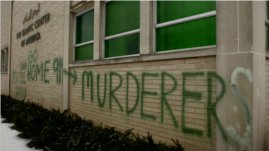Teachers' Domain - Digital Media for the Classroom and Professional Development
User: Preview

Source: Finding Your Roots: "Rick Warren, Angela Buchdahl, and Yasir Qadhi"



NARRATION: Religious texts-like historical events-are constantly being reinterpreted, and one of the most important functions of our religious leaders is to act as our guides. But on September 11th, 2001, a group of men with their own perverse, radical interpretation of their version of their religion perpetrated the largest act of terror on American soil.
For Americans of every faith, it was a day that would test our principles of democratic rights and religious tolerance. Across the country, many people turned to God in an attempt to understand this horrible event, while others unfortunately sought to lay blame upon an entire faith.
For Yasir Qhadi, his understanding of what it means to be a Muslim in America would be altered forever, after he heard the devastating news while studying Islamic theology as a graduate student in Saudi Arabia.
YASIR QADHI: I was going to the mosque on 9/11 and an American friend who lives a little bit far away was running down towards my mosque. And he was like, “Yasir, Yasir, did you hear what happened?” I was like, “What? What happened.” He said that there’s been an attack on the World Trade Center and they think it’s Muslims who did it. And I remember I just like froze outside the mosque. I had a premonition that this would be bad.
HENRY LOUIS GATES, JR.: Um-hum.
QADHI: But I didn’t know how bad it would be. And I had planned to come back to America in the winter break in January. And as the weeks go by, my father keeps on getting more and more insistent. Do not come back to America right now. You don’t understand what’s going on, the paranoia. I’m like, “I just want to come visit. I just…”you know, I haven’t been back for half-a-year. You know, I mean we have a newborn. My, my oldest son, Amar, was born.
GATES: And you’re an American, you have an American passport.
QADHI: Yeah. Of course. I was born in America. My wife’s American. My kids are American. We’re all American. Yeah.
GATES: Um-hum.
QADHI: And my father was like, “No. It’s not the time right now. You don’t understand the paranoia.” And I didn’t understand the paranoia because I'm still in Medina.
GATES: Um-hum.
QADHI: You know, I understand the world’s changing but not…I did not understand the paranoia. And so, we actually ended up not returning to visit the family, uh, you know, for that, for that period of time.
NARRATION: When Yasir did return to America the following year, his reception was quite uncomfortable. American attitudes towards Muslims had changed, and changed dramatically.
QADHI: Multiple times people called me Bin Laden.
GATES: They did?
QADHI: Oh, yeah. And I remember, we were in a shopping center once and, uh, somebody just walked straight up to me. Like, literally face to face and my wife was next to me and she was carrying Amar. And he said, uh, “you guys don’t belong here” and then he walked away.
GATES: Hum.
QADHI: This was not the America that I remembered. This is not the America…the way that it should be. It’s just…it’s sad. It really is.
NARRATION: Together, Yasir and I made a pilgrimage to the 9/11 memorial in Lower Manhattan. It was a haunting experience to walk through the Memorial with him, reading the names of the people who perished on that terrible day.
QADHI: This is an African-Muslim name.
NARRATION: Yasir told me that the difficulty he experienced after 9/11 profoundly reshaped his sense of tolerance for the beliefs of people of other faiths, and especially the persecution they've experienced for those beliefs.
 Loading Standards
Loading Standards